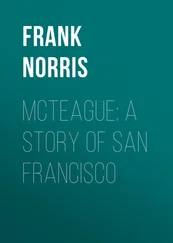Frank Norris - The Octopus - A Story of California
Здесь есть возможность читать онлайн «Frank Norris - The Octopus - A Story of California» — ознакомительный отрывок электронной книги совершенно бесплатно, а после прочтения отрывка купить полную версию. В некоторых случаях можно слушать аудио, скачать через торрент в формате fb2 и присутствует краткое содержание. Жанр: foreign_prose, literature_19, foreign_antique, на английском языке. Описание произведения, (предисловие) а так же отзывы посетителей доступны на портале библиотеки ЛибКат.
- Название:The Octopus : A Story of California
- Автор:
- Жанр:
- Год:неизвестен
- ISBN:нет данных
- Рейтинг книги:5 / 5. Голосов: 1
-
Избранное:Добавить в избранное
- Отзывы:
-
Ваша оценка:
- 100
- 1
- 2
- 3
- 4
- 5
The Octopus : A Story of California: краткое содержание, описание и аннотация
Предлагаем к чтению аннотацию, описание, краткое содержание или предисловие (зависит от того, что написал сам автор книги «The Octopus : A Story of California»). Если вы не нашли необходимую информацию о книге — напишите в комментариях, мы постараемся отыскать её.
The Octopus : A Story of California — читать онлайн ознакомительный отрывок
Ниже представлен текст книги, разбитый по страницам. Система сохранения места последней прочитанной страницы, позволяет с удобством читать онлайн бесплатно книгу «The Octopus : A Story of California», без необходимости каждый раз заново искать на чём Вы остановились. Поставьте закладку, и сможете в любой момент перейти на страницу, на которой закончили чтение.
Интервал:
Закладка:
“Tell me when the P. and S. W. ever paid dividends.”
“The lowest rates,” continued S. Behrman, “that the legislature can establish must be such as will secure us a fair interest on our investment.”
“Well, what’s your standard? Come, let’s hear it. Who is to say what’s a fair rate? The railroad has its own notions of fairness sometimes.”
“The laws of the State,” returned S. Behrman, “fix the rate of interest at seven per cent. That’s a good enough standard for us. There is no reason, Mr. Harran, why a dollar invested in a railroad should not earn as much as a dollar represented by a promissory note—seven per cent. By applying your schedule of rates we would not earn a cent; we would be bankrupt.”
“Interest on your investment!” cried Harran, furious. “It’s fine to talk about fair interest. I know and you know that the total earnings of the P. and S. W.—their main, branch and leased lines for last year—was between nineteen and twenty millions of dollars. Do you mean to say that twenty million dollars is seven per cent. of the original cost of the road?”
S. Behrman spread out his hands, smiling.
“That was the gross, not the net figure—and how can you tell what was the original cost of the road?” “Ah, that’s just it,” shouted Harran, emphasising each word with a blow of his fist upon his knee, his eyes sparkling, “you take cursed good care that we don’t know anything about the original cost of the road. But we know you are bonded for treble your value; and we know this: that the road COULD have been built for fifty-four thousand dollars per mile and that you SAY it cost you eighty-seven thousand. It makes a difference, S. Behrman, on which of these two figures you are basing your seven per cent.”
“That all may show obstinacy, Harran,” observed S. Behrman vaguely, “but it don’t show common sense.”
“We are threshing out old straw, I believe, gentlemen,” remarked Magnus. “The question was thoroughly sifted in the courts.”
“Quite right,” assented S. Behrman. “The best way is that the railroad and the farmer understand each other and get along peaceably. We are both dependent on each other. Your ploughs, I believe, Mr. Derrick.” S. Behrman nodded toward the flat cars.
“They are consigned to me,” admitted Magnus.
“It looks a trifle like rain,” observed S. Behrman, easing his neck and jowl in his limp collar. “I suppose you will want to begin ploughing next week.”
“Possibly,” said Magnus.
“I’ll see that your ploughs are hurried through for you then, Mr. Derrick. We will route them by fast freight for you and it won’t cost you anything extra.”
“What do you mean?” demanded Harran. “The ploughs are here. We have nothing more to do with the railroad. I am going to have my wagons down here this afternoon.”
“I am sorry,” answered S. Behrman, “but the cars are going north, not, as you thought, coming FROM the north. They have not been to San Francisco yet.”
Magnus made a slight movement of the head as one who remembers a fact hitherto forgotten. But Harran was as yet unenlightened.
“To San Francisco!” he answered, “we want them here—what are you talking about?”
“Well, you know, of course, the regulations,” answered S. Behrman. “Freight of this kind coming from the Eastern points into the State must go first to one of our common points and be reshipped from there.”
Harran did remember now, but never before had the matter so struck home. He leaned back in his seat in dumb amazement for the instant. Even Magnus had turned a little pale. Then, abruptly, Harran broke out violent and raging.
“What next? My God, why don’t you break into our houses at night? Why don’t you steal the watch out of my pocket, steal the horses out of the harness, hold us up with a shot-gun; yes, ‘stand and deliver; your money or your life.’ Here we bring our ploughs from the East over your lines, but you’re not content with your long-haul rate between Eastern points and Bonneville. You want to get us under your ruinous short-haul rate between Bonneville and San Francisco, AND RETURN. Think of it! Here’s a load of stuff for Bonneville that can’t stop at Bonneville, where it is consigned, but has got to go up to San Francisco first BY WAY OF Bonneville, at forty cents per ton and then be reshipped from San Francisco back to Bonneville again at FIFTY-ONE cents per ton, the short-haul rate. And we have to pay it all or go without. Here are the ploughs right here, in sight of the land they have got to be used on, the season just ready for them, and we can’t touch them. Oh,” he exclaimed in deep disgust, “isn’t it a pretty mess! Isn’t it a farce! the whole dirty business!”
S. Behrman listened to him unmoved, his little eyes blinking under his fat forehead, the gold chain of hollow links clicking against the pearl buttons of his waistcoat as he breathed.
“It don’t do any good to let loose like that, Harran,” he said at length. “I am willing to do what I can for you. I’ll hurry the ploughs through, but I can’t change the freight regulation of the road.”
“What’s your blackmail for this?” vociferated Harran. “How much do you want to let us go? How much have we got to pay you to be ALLOWED to use our own ploughs—what’s your figure? Come, spit it out.”
“I see you are trying to make me angry, Harran,” returned S. Behrman, “but you won’t succeed. Better give up trying, my boy. As I said, the best way is to have the railroad and the farmer get along amicably. It is the only way we can do business. Well, s’long, Governor, I must trot along. S’long, Harran.” He took himself off.
But before leaving Guadalajara Magnus dropped into the town’s small grocery store to purchase a box of cigars of a certain Mexican brand, unprocurable elsewhere. Harran remained in the buggy.
While he waited, Dyke appeared at the end of the street, and, seeing Derrick’s younger son, came over to shake hands with him. He explained his affair with the P. and S. W., and asked the young man what he thought of the expected rise in the price of hops.
“Hops ought to be a good thing,” Harran told him. “The crop in Germany and in New York has been a dead failure for the last three years, and so many people have gone out of the business that there’s likely to be a shortage and a stiff advance in the price. They ought to go to a dollar next year. Sure, hops ought to be a good thing. How’s the old lady and Sidney, Dyke?”
“Why, fairly well, thank you, Harran. They’re up to Sacramento just now to see my brother. I was thinking of going in with my brother into this hop business. But I had a letter from him this morning. He may not be able to meet me on this proposition. He’s got other business on hand. If he pulls out—and he probably will—I’ll have to go it alone, but I’ll have to borrow. I had thought with his money and mine we would have enough to pull off the affair without mortgaging anything. As it is, I guess I’ll have to see S. Behrman.”
“I’ll be cursed if I would!” exclaimed Harran.
“Well, S. Behrman is a screw,” admitted the engineer, “and he is ‘railroad’ to his boots; but business is business, and he would have to stand by a contract in black and white, and this chance in hops is too good to let slide. I guess we’ll try it on, Harran. I can get a good foreman that knows all about hops just now, and if the deal pays—well, I want to send Sid to a seminary up in San Francisco.”
“Well, mortgage the crops, but don’t mortgage the homestead, Dyke,” said Harran. “And, by the way, have you looked up the freight rates on hops?”
“No, I haven’t yet,” answered Dyke, “and I had better be sure of that, hadn’t I? I hear that the rate is reasonable, though.”
Читать дальшеИнтервал:
Закладка:
Похожие книги на «The Octopus : A Story of California»
Представляем Вашему вниманию похожие книги на «The Octopus : A Story of California» списком для выбора. Мы отобрали схожую по названию и смыслу литературу в надежде предоставить читателям больше вариантов отыскать новые, интересные, ещё непрочитанные произведения.
Обсуждение, отзывы о книге «The Octopus : A Story of California» и просто собственные мнения читателей. Оставьте ваши комментарии, напишите, что Вы думаете о произведении, его смысле или главных героях. Укажите что конкретно понравилось, а что нет, и почему Вы так считаете.












